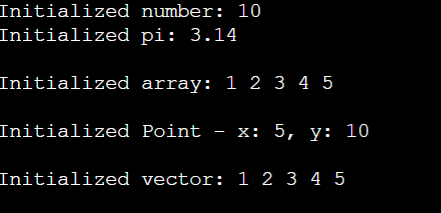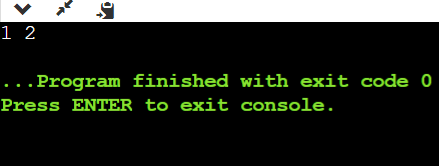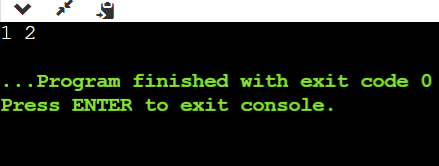C++ Tutorial
C++ Control Statement
C++ Functions
C++ Arrays
C++ Pointers
C++ Object Class
C++ Inheritance
C++ Polymorphism
C++ Abstraction
C++ Namespaces
C++ Strings
C++ Exceptions
C++ Templates
Signal Handling
C++ File & Stream
C++ Misc
C++ STL Tutorial
C++ Iterators
C++ Programs
MCQ
Interview Question
Uniform Initialization in C++Uniform Initialization:The initialization and assignment of values to objects has been an area of development and improvement in the field of C++ programming. The inclusion of uniform initialization in C++11 was one such step towards a more standardized and user-friendly initialization syntax. The purpose of this functionality was to make initializing objects across different data types and containers easier. With its clear and consistent approach, uniform initialization offers advantages in compatibility, flexibility, and readable code. In C++11, uniform initialization is a feature that makes it possible to initialize variables and objects, from simple types to aggregates, using a standard syntax. Stated differently, it presents brace initialization, which encloses initializer values with braces ({}). Comprehending Uniform Initialization:Before C++11, there were other approaches to initialize objects, including the use of curly braces, brackets, and the conventional assignment operator. For example:
Syntax of Uniform initialization:
This is a synopsis of its syntax: 1. Initialization of fundamental data types: 2. Initialization of arrays: 3. Initialization of user-defined types (classes and structs): 4. Initialization of containers (like std::vector, std::array, std::map, etc.): Program:Let us take a program to illustrate the use of uniform initialization in C++: Output: 
Example 2: Implicitly Initialize Function ParameterOutput: 
Example 3: Implicitly initialize objects to returnOutput: 
Benefits of Standard Initialization:-There are several benefits of standard initialization. Some main benefits of the uniform initialization are as follows:
|
 For Videos Join Our Youtube Channel: Join Now
For Videos Join Our Youtube Channel: Join Now
Feedback
- Send your Feedback to [email protected]
Help Others, Please Share










